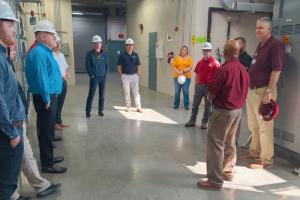New tool helps provide clear path to accelerate sustainability

Image from Getty Images
The U.S. health care sector contributes approximately 8.5% of the country’s greenhouse gas emissions, a number that many in the field have resolved to reduce. Approximately 15% of hospitals in the U.S. have signed the Department of Health and Human Services' pledge demonstrating their commitment. Many health systems are now examining Scope 1, 2 and 3 emissions and looking at how regulatory requirements as well as incentives can support and foster this transformation. Health care organizations are driven by a shared mission to foster health and wellbeing, a mission hampered by the growing reality of climate change.
No matter where a hospital sits on its sustainability journey, organizations may face unique challenges based on their geographic setting, workforce and community profiles, relevant laws and policies, and financial situation. Which is why the International Hospital Federation’s Geneva Sustainability Centre created a new tool called the Sustainability Accelerator Tool (SAT) that is designed to meet organizations wherever they are on their journey.
The SAT, designed in collaboration with Deloitte, was launched specifically for health care organizations to not only assist them in accurately assessing their individual sustainability, climate, and equity impact and maturity, but also to enable reporting, benchmarking, learning and performance comparison. Subscribers to the web-based tool also receive feedback, guidance and action-oriented recommendations to accelerate progress.
The SAT contains a wealth of data and has been piloted and now adopted by hospitals around the world. Attendees at the upcoming International Summit & Exhibition on Health Facility Planning, Design & Construction (PDC Summit) can get a first-hand demonstration of the tool on March 18 at 1:20 p.m., at the PDC Summit Discovery Stage.
During the demo, “Enabling hospitals and health care leaders to advance on their sustainability journey: The Sustainability Accelerator Tool,” Ellis Rosenberg, climate and equity activation strategist, vice president, Deloitte Services LP, will explain how the tool works in practice, its benefits and how organizations can use it to improve their sustainability performance.
“The Sustainability Accelerator Tool is highly relevant to PDC Summit attendees and the health care systems they represent, as it addresses key challenges in how health care facilities are designed, managed and operated,” says David Rabinowitz, principal, Deloitte Consulting LLP. “It provides a practical tool to help organizations improve sustainability, and continue their commitment towards a more equitable future, especially as more and more health care systems navigate the intersection of climate, health equity, the drivers of health, and clinical outcomes and cost.”
One of the SAT’s most compelling features is the knowledge-sharing it provides. It can be easier to gain consensus on the importance of tackling health care’s greenhouse gas emissions, but harder to agree on the best strategies to address the issue and how to fund solutions. That’s a challenge the SAT intends to meet.
“The Sustainability Accelerator Tool aims to provide insights for health systems across several important domains including environmental impact, health, equity and well-being and leadership and governance, all key areas to take action on in sustainability. The tool provides a platform where systems can see how they are doing generally with their peers,” says Dr. Elizabeth Baca, managing director, Deloitte Consulting LLP. “It also provides a global benchmark to understand good practices and comparable insights to understand where an organization stands on their sustainability journey.”
Hospitals that have piloted the SAT report how they were able to simplify and gain clarity on their environmental stewardship goals and how to achieve them. The tool’s wider launch into the field means even more hospitals will be able to do the same. The American Hospital Association has included it as a key step in its Sustainability Roadmap for Health Care. In addition to the demo slated for the PDC Summit, health care organizations can test out the program with a free online trial.
The 2024 PDC Summit taking place in San Diego, March 17-20, will feature several other sustainability-focused sessions.
For instance, Kara Brooks, MS, LEED AP BD+C, senior associate director of sustainability at the American Society for Health Care Engineering, will lead a panel discussion on March 18 for the afternoon general session, “Prescribing Sustainability: Explore Multifaceted Paths to Hospital Decarbonization.” Several breakout sessions will also highlight sustainability best practices during the conference. Visit the PDC Summit’s website to see the full lineup.





